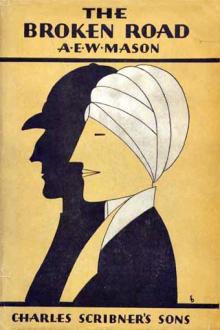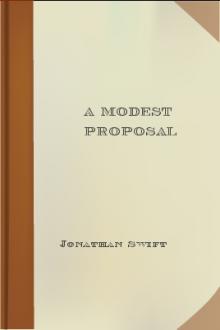The Devil's Dictionary by Ambrose Bierce (good novels to read in english TXT) 📗

- Author: Ambrose Bierce
Book online «The Devil's Dictionary by Ambrose Bierce (good novels to read in english TXT) 📗». Author Ambrose Bierce
Bissell Gip
HEAVEN, n. A place where the wicked cease from troubling you with talk of their personal affairs, and the good listen with attention while you expound your own.
HEBREW, n. A male Jew, as distinguished from the Shebrew, an altogether superior creation.
HELPMATE, n. A wife, or bitter half.
"Now, why is yer wife called a helpmate, Pat?" Says the priest. "Since the time 'o yer wooin' She's niver [sic] assisted in what ye were at— For it's naught ye are ever doin'." "That's true of yer Riverence [sic]," Patrick replies, And no sign of contrition envices; "But, bedad, it's a fact which the word implies, For she helps to mate the expinses [sic]!"Marley Wottel
HEMP, n. A plant from whose fibrous bark is made an article of neckwear which is frequently put on after public speaking in the open air and prevents the wearer from taking cold.
HERMIT, n. A person whose vices and follies are not sociable.
HERS, pron. His.
HIBERNATE, v.i. To pass the winter season in domestic seclusion. There have been many singular popular notions about the hibernation of various animals. Many believe that the bear hibernates during the whole winter and subsists by mechanically sucking its paws. It is admitted that it comes out of its retirement in the spring so lean that it had to try twice before it can cast a shadow. Three or four centuries ago, in England, no fact was better attested than that swallows passed the winter months in the mud at the bottom of their brooks, clinging together in globular masses. They have apparently been compelled to give up the custom on account of the foulness of the brooks. Sotus Ecobius discovered in Central Asia a whole nation of people who hibernate. By some investigators, the fasting of Lent is supposed to have been originally a modified form of hibernation, to which the Church gave a religious significance; but this view was strenuously opposed by that eminent authority, Bishop Kip, who did not wish any honors denied to the memory of the Founder of his family.
HIPPOGRIFF, n. An animal (now extinct) which was half horse and half griffin. The griffin was itself a compound creature, half lion and half eagle. The hippogriff was actually, therefore, a one-quarter eagle, which is two dollars and fifty cents in gold. The study of zoology is full of surprises.
HISTORIAN, n. A broad-gauge gossip.
HISTORY, n. An account mostly false, of events mostly unimportant, which are brought about by rulers mostly knaves, and soldiers mostly fools.
Of Roman history, great Niebuhr's shown 'Tis nine-tenths lying. Faith, I wish 'twere known, Ere we accept great Niebuhr as a guide, Wherein he blundered and how much he lied.Salder Bupp
HOG, n. A bird remarkable for the catholicity of its appetite and serving to illustrate that of ours. Among the Mahometans and Jews, the hog is not in favor as an article of diet, but is respected for the delicacy and the melody of its voice. It is chiefly as a songster that the fowl is esteemed; the cage of him in full chorus has been known to draw tears from two persons at once. The scientific name of this dicky-bird is Porcus Rockefelleri. Mr. Rockefeller did not discover the hog, but it is considered his by right of resemblance.
HOMOEOPATHIST, n. The humorist of the medical profession.
HOMOEOPATHY, n. A school of medicine midway between Allopathy and Christian Science. To the last both the others are distinctly inferior, for Christian Science will cure imaginary diseases, and they can not.
HOMICIDE, n. The slaying of one human being by another. There are four kinds of homocide: felonious, excusable, justifiable, and praiseworthy, but it makes no great difference to the person slain whether he fell by one kind or another—the classification is for advantage of the lawyers.
HOMILETICS, n. The science of adapting sermons to the spiritual needs, capacities and conditions of the congregation.
So skilled the parson was in homiletics That all his normal purges and emetics To medicine the spirit were compounded With a most just discrimination founded Upon a rigorous examination Of tongue and pulse and heart and respiration. Then, having diagnosed each one's condition, His scriptural specifics this physician Administered—his pills so efficacious And pukes of disposition so vivacious That souls afflicted with ten kinds of Adam Were convalescent ere they knew they had 'em. But Slander's tongue—itself all coated—uttered Her bilious mind and scandalously muttered That in the case of patients having money The pills were sugar and the pukes were honey.Biography of Bishop Potter
HONORABLE, adj. Afflicted with an impediment in one's reach. In legislative bodies it is customary to mention all members as honorable; as, "the honorable gentleman is a scurvy cur."
HOPE, n. Desire and expectation rolled into one.
Delicious Hope! when naught to man is left— Of fortune destitute, of friends bereft; When even his dog deserts him, and his goat With tranquil disaffection chews his coat While yet it hangs upon his back; then thou, The star far-flaming on thine angel brow, Descendest, radiant, from the skies to hint The promise of a clerkship in the Mint.Fogarty Weffing
HOSPITALITY, n. The virtue which induces us to feed and lodge certain persons who are not in need of food and lodging.
HOSTILITY, n. A peculiarly sharp and specially applied sense of the earth's overpopulation. Hostility is classified as active and passive; as (respectively) the feeling of a woman for her female friends, and that which she entertains for all the rest of her sex.
HOURI, n. A comely female inhabiting the Mohammedan Paradise to make things cheery for the good Mussulman, whose belief in her existence marks a noble discontent with his earthly spouse, whom he denies a soul. By that good lady the Houris are said to be held in deficient esteem.
HOUSE, n. A hollow edifice erected for the habitation of man, rat, mouse, beetle, cockroach, fly, mosquito, flea, bacillus and microbe. House of Correction, a place of reward for political and personal service, and for the detention of offenders and appropriations. House of God, a building with a steeple and a mortgage on it. House-dog, a pestilent beast kept on domestic premises to insult persons passing by and appal the hardy visitor. House-maid, a youngerly person of the opposing sex employed to be variously disagreeable and ingeniously unclean in the station in which it has pleased God to place her.
HOUSELESS, adj. Having paid all taxes on household goods.
HOVEL, n. The fruit of a flower called the Palace.
Twaddle had a hovel, Twiddle had a palace; Twaddle said: "I'll grovel Or he'll think I bear him malice"— A sentiment as novel As a castor on a chalice. Down upon the middle Of his legs fell Twaddle And astonished Mr. Twiddle, Who began to lift his noddle. Feed upon the fiddle- Faddle flummery, unswaddle




Comments (0)